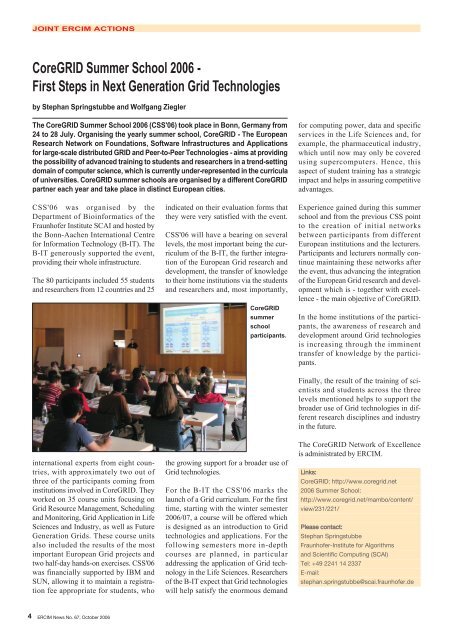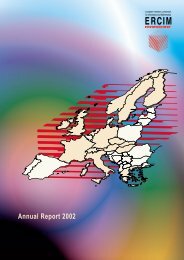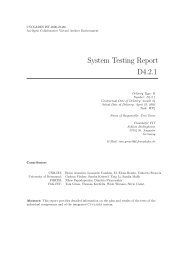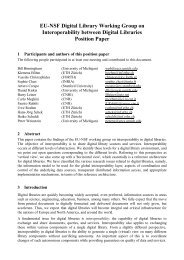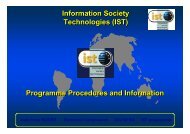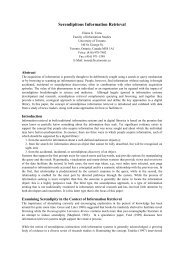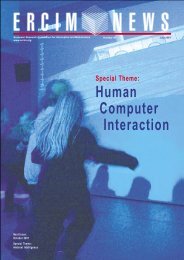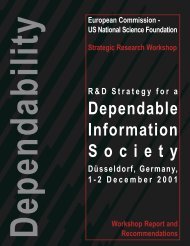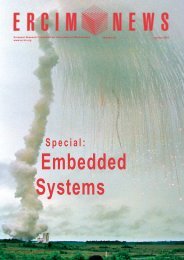Towards a Platform for Widespread Embedded Intelligence - ERCIM
Towards a Platform for Widespread Embedded Intelligence - ERCIM
Towards a Platform for Widespread Embedded Intelligence - ERCIM
Create successful ePaper yourself
Turn your PDF publications into a flip-book with our unique Google optimized e-Paper software.
4<br />
JOINT <strong>ERCIM</strong> ACTIONS<br />
CoreGRID Summer School 2006 -<br />
First Steps in Next Generation Grid Technologies<br />
by Stephan Springstubbe and Wolfgang Ziegler<br />
The CoreGRID Summer School 2006 (CSS'06) took place in Bonn, Germany from<br />
24 to 28 July. Organising the yearly summer school, CoreGRID - The European<br />
Research Network on Foundations, Software Infrastructures and Applications<br />
<strong>for</strong> large-scale distributed GRID and Peer-to-Peer Technologies - aims at providing<br />
the possibility of advanced training to students and researchers in a trend-setting<br />
domain of computer science, which is currently under-represented in the curricula<br />
of universities. CoreGRID summer schools are organised by a different CoreGRID<br />
partner each year and take place in distinct European cities.<br />
CSS'06 was organised by the<br />
Department of Bioin<strong>for</strong>matics of the<br />
Fraunhofer Institute SCAI and hosted by<br />
the Bonn-Aachen International Centre<br />
<strong>for</strong> In<strong>for</strong>mation Technology (B-IT). The<br />
B-IT generously supported the event,<br />
providing their whole infrastructure.<br />
The 80 participants included 55 students<br />
and researchers from 12 countries and 25<br />
international experts from eight countries,<br />
with approximately two out of<br />
three of the participants coming from<br />
institutions involved in CoreGRID. They<br />
worked on 35 course units focusing on<br />
Grid Resource Management, Scheduling<br />
and Monitoring, Grid Application in Life<br />
Sciences and Industry, as well as Future<br />
Generation Grids. These course units<br />
also included the results of the most<br />
important European Grid projects and<br />
two half-day hands-on exercises. CSS'06<br />
was financially supported by IBM and<br />
SUN, allowing it to maintain a registration<br />
fee appropriate <strong>for</strong> students, who<br />
<strong>ERCIM</strong> News No. 67, October 2006<br />
indicated on their evaluation <strong>for</strong>ms that<br />
they were very satisfied with the event.<br />
CSS'06 will have a bearing on several<br />
levels, the most important being the curriculum<br />
of the B-IT, the further integration<br />
of the European Grid research and<br />
development, the transfer of knowledge<br />
to their home institutions via the students<br />
and researchers and, most importantly,<br />
CoreGRID<br />
summer<br />
school<br />
participants.<br />
the growing support <strong>for</strong> a broader use of<br />
Grid technologies.<br />
For the B-IT the CSS'06 marks the<br />
launch of a Grid curriculum. For the first<br />
time, starting with the winter semester<br />
2006/07, a course will be offered which<br />
is designed as an introduction to Grid<br />
technologies and applications. For the<br />
following semesters more in-depth<br />
courses are planned, in particular<br />
addressing the application of Grid technology<br />
in the Life Sciences. Researchers<br />
of the B-IT expect that Grid technologies<br />
will help satisfy the enormous demand<br />
<strong>for</strong> computing power, data and specific<br />
services in the Life Sciences and, <strong>for</strong><br />
example, the pharmaceutical industry,<br />
which until now may only be covered<br />
using supercomputers. Hence, this<br />
aspect of student training has a strategic<br />
impact and helps in assuring competitive<br />
advantages.<br />
Experience gained during this summer<br />
school and from the previous CSS point<br />
to the creation of initial networks<br />
between participants from different<br />
European institutions and the lecturers.<br />
Participants and lecturers normally continue<br />
maintaining these networks after<br />
the event, thus advancing the integration<br />
of the European Grid research and development<br />
which is - together with excellence<br />
- the main objective of CoreGRID.<br />
In the home institutions of the participants,<br />
the awareness of research and<br />
development around Grid technologies<br />
is increasing through the imminent<br />
transfer of knowledge by the participants.<br />
Finally, the result of the training of scientists<br />
and students across the three<br />
levels mentioned helps to support the<br />
broader use of Grid technologies in different<br />
research disciplines and industry<br />
in the future.<br />
The CoreGRID Network of Excellence<br />
is administrated by <strong>ERCIM</strong>.<br />
Links:<br />
CoreGRID: http://www.coregrid.net<br />
2006 Summer School:<br />
http://www.coregrid.net/mambo/content/<br />
view/231/221/<br />
Please contact:<br />
Stephan Springstubbe<br />
Fraunhofer-Institute <strong>for</strong> Algorithms<br />
and Scientific Computing (SCAI)<br />
Tel: +49 2241 14 2337<br />
E-mail:<br />
stephan.springstubbe@scai.fraunhofer.de


